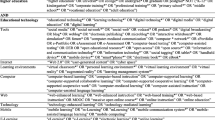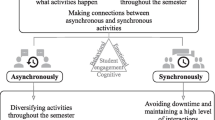Abstract
This qualitative study makes the case for the implementation of curriculum mapping, a procedure that creates a visual representation of curriculum based on real time information, as a way to increase collaboration and collegiality in higher education. Through the use of curriculum mapping, eleven faculty members in a western state university Teacher Licensure program aligned and revised the teacher education curriculum across a sequence of courses. An increase in collaboration and collegiality among faculty emerged as an unintended outcome as a result of participation in the project.

Similar content being viewed by others
References
Barnes, L. L. B., Agago, M. O., & Coombs, W. T. (1998). Effects of job-related stress on faculty: Intention to leave academia. Research in Higher Education, 39(4), 457–469.
Damrosch, D. (1995). We scholars: Changing the culture of the university. Cambridge, MA: Harvard University Press.
Dictionary.com (2007). Retrieved January 21, 2008, from http://www.dictionary.com
Donald, J. (1997). Improving the environment for learning. San Francisco, CA: Jossey-Bass.
Fogg, P. (2006, September 29). Young Ph.D.’s say collegiality matters more than salary. The Chronicle of Higher Education, p. 1.
Fullan, M. (2001). The new meaning of educational change (3rd ed.). New York, NY: Teachers College Press.
Goodlad, J. I. (1984). A place called school: Prospects for the future. New York, NY: McGraw-Hill.
Grossman, P., Wineburg, S., & Woolworth, S. (2001). Toward a theory of teacher community. Teachers College Record, 103(6), 942–1012.
Hall, G. E., & Hord, S. M. (2006). Implementing change: Patterns, principles, and potholes. Boston, MA: Allyn and Bacon.
Haworth, J., & Conrad, C. (1997). Emblems of quality in higher education. Boston, MA: Allyn and Bacon.
Jacobs, H. H. (1997). Mapping the big picture: Integrating curriculum and assessment K-12. Alexandria, VA: Association for Supervision and Curriculum Development.
Jacobs, H. H. (2004). Getting results with curriculum mapping. Alexandria, VA: Association for Supervision and Curriculum Development.
Kaplan, J. (Ed.). (1992). Familiar quotations: A collection of passages, phrases, and proverbs traced to their sources in ancient and modern literature (16th ed.). Boston, MA: Little, Brown and Company, p. 281.
Lortie, D. C. (1975). Schoolteacher: A sociological study. Chicago, IL: University of Chicago Press.
Massy, W. F., & Wilger, A. K. (1994). Overcoming “hollowed” collegiality. Change, 26(4), 11–20.
Miles, M. B., & Huberman, A. M. (1994). Qualitative data analysis: An expanded sourcebook (2nd ed.). Thousand Oaks, CA: Sage Publications, Inc.
National Science Foundation. (2007). Grant Proposal Guide. Retrieved February 22, 2008, from www.nsf.gov/publications/
Palmer, P. J. (1998). The courage to teach: Exploring the inner landscape of a teacher’s life. San Francisco, CA: Jossey-Bass.
Sarason, S. B. (1996). Revisiting the culture of the school and the problem of change. New York, NY: Teachers College Press.
ThinkExist.com (2008, April 1). Henry Ford quotes. Retrieved May 1, 2008, from http://en.thinkexist.com/quotes/Henry_Ford/
Tierney, W. G. (1999). Faculty productivity and academic culture. In W. G. Tierney (Ed.), Faculty productivity: Facts, fictions, and issues (pp. 39–54). New York, NY: Falmer Press.
Tierney, W. G., & Rhoads, R. A. (1994). Faculty socialization as a cultural process: A mirror of institutional commitment. ASHE-ERIC Higher Education Report No. 93-6. Washington, DC: The George Washington University School of Education and Human Development.
Udelhofen, S. (2005). Keys to curriculum mapping: Strategies and tools to make it work. Thousand Oaks, CA: Sage Publications, Inc.
U.S. Department of Labor. (1991). What work requires of schools: A SCANS report for America 2000. Washington, DC: U.S. Department of Labor.
Van Patten, J. J. (2000). Higher education culture: Case studies for a new century. Lanham, NY: University Press of America, Inc.
Author information
Authors and Affiliations
Corresponding author
Additional information
Kay Pippin Uchiyama
is currently the Assessment Coordinator for the Poudre School District in Fort Collins, Colorado. During this study, she was an Assistant Professor of Teacher Education at Colorado State University and a co-primary investigator for the Preparing Tomorrow’s Teachers to Use Data grant. She received her Ph.D. in Instruction and Curriculum in the Content Areas with an emphasis on Teacher Education and Learning to Teach from the University of Colorado at Boulder. Her interests include data driven instruction, assessment for learning, teacher education, professional development schools, and mathematics education. Her email is kuchiyam@psdschools.org.
Jean L. Radin
is an adjunct professor at Colorado State University and a co-primary investigator for the Preparing Tomorrow’s Teachers to Use Data grant. She received her Ph.D. from Colorado State University. Her interests are brain-based teaching and learning, data driven instructional practices, teacher education and professional development schools. Her email is jradin@cahs.colorado.edu.
Rights and permissions
About this article
Cite this article
Uchiyama, K.P., Radin, J.L. Curriculum Mapping in Higher Education: A Vehicle for Collaboration. Innov High Educ 33, 271–280 (2009). https://doi.org/10.1007/s10755-008-9078-8
Published:
Issue Date:
DOI: https://doi.org/10.1007/s10755-008-9078-8




